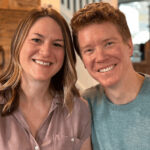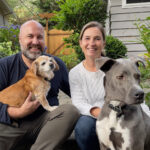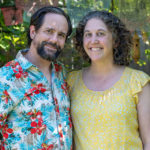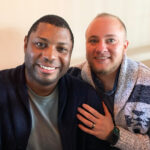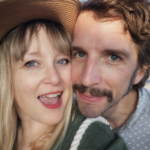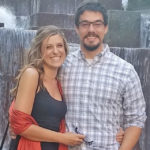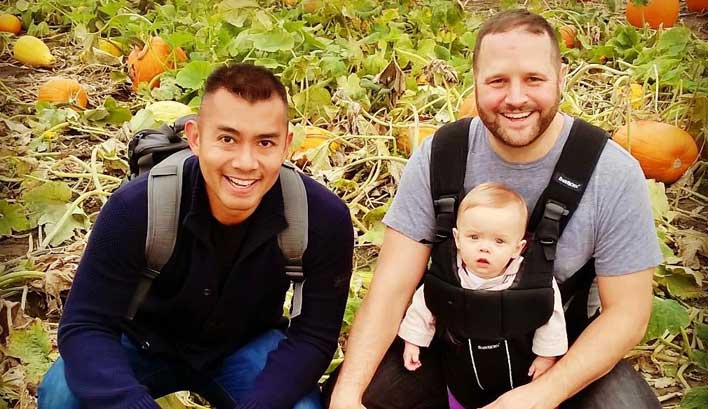By: Rich Kocher, OA&FS Adoptive Father
My daughter M has naturally fine blond hair cut in a short bob that frames soft, delicate features. Her eyes are bright and blue with lashes that are enviably long and thick. While petite, her lean frame gives her a tall and lanky appearance. Her milky white complexion flushes rose-red easily and tans effortlessly in the summer. These attributes are in stark contrast to my thick black hair, dark brown eyes and tanned skin. Despite my German surname (I have German ancestors), I am mostly of Filipino descent and I possess many of the typical physical traits of my heritage – almond shaped eyes, high cheekbones and a flatter nose. While cognizant of the differences, it never really bothered me that M and I looked different. I was even proud of the fact that my Caucasian husband who shares the same blue eyes would frequently receive comments such as, “she looks just like you!” or “she has her daddy’s eyes.” Instead, comments to me were more like, “she must look like her mom” or “does your wife have blond hair?” Again, it wasn’t particularly worrisome for me. Perhaps I was still in new parent bliss, but I didn’t think much of it. I was her father, our coloring wasn’t an issue and something I didn’t think was a big deal. Until it was.
One spring day on the playground, not far from our house, I was swinging a then 7-month-old M on a swing next to another young baby and her mother. I smiled at her child and then at her, as I caught her gazing at M and me, she asked, “Is she yours?” To which I replied, “Yes, she’s 7 months.” I thought it was a strange way to start a conversation, but the next question confused and stumped me. She followed up with, “Why don’t you look the same?” There are all sorts of responses I wish I had used, such as “Why would you ask that?” “How is that your business?” “That’s a rude thing to say.” However, I was caught off guard and instead replied with the simple truth, “because she’s adopted.” After a couple seconds, my face become hot and I felt anxious and roughly uncomfortable but I didn’t know why. I muttered a goodbye to the other mother and immediately removed M from the swing, put her in the stroller and rushed home, seeking a sanctuary. I put M in a bouncer and sat down on the couch in silence. I guess I was trying to sort out what happened and why I was feeling so distraught. I knew her question and my flustered response bothered me, but I didn’t know why and I didn’t know why the impact was so great.
Why was this such as big deal for me? While the tone and nature of the question was rude, it’s not what upset me. After mulling it over for a couple days, I realized that she wasn’t really asking about our physical attributes. She was questioning my validity as M’s father.
“Why don’t you look the same?” = “How can you be her real father?”
I became angry and saddened that a stranger within minutes of meeting me would call that into question. I get it’s not obvious from looking at us, but she doubted my initial answer and felt the need to follow up. We found out about the last minute adoption placement within 2 weeks of M’s due date and she was at our home within 36 hours of her birth. I was up with her at all hours of the night for feedings, comforted her when she was upset, entertained her, and took countless photos of her. I fell in love with her when she smiled at me for the first time. My husband and I were equal partners in the duties of parenthood, yet my role was called into question solely because I am Filipino and I have a white looking daughter. The kicker is M is biologically one quarter Filipina. Her grandfather was born in the Philippines and the birth mother chose us, in part, because she wanted her daughter to be connected to her ethnic roots. Ironically, my ethnicity was a major factor in M’s placement with us and yet also a factor in doubting my parentage. She may not look the part, but M is quite the stereotypical Filipina toddler. In addition to her blue eyes and blond hair, she is sweet, charming, dishes out hugs liberally and fits easily into family get togethers. She loves rice, pancit and lumpia, and shows respect to my parents (her Lolo and Lola) and adores her Great Grandmother.
Despite living in one of the most liberal areas of the country, in that moment, my role as M’s father was made to feel diminished and small because of perceived racial differences. Looking back, I don’t feel the mother was being racist, but I suspect her doubts come from the ignorance about adoption, particularly transracial adoption. She narrowly viewed parenthood from a traditional lens, completely oblivious to what other family make-ups may look like. Shortly after this happened I became much more cognizant of our differences particularly when it’s just M and I in public spaces. If people stare at us quizzically, I wonder if they are thinking I’m a nanny or a babysitter, rather than her real father? It’s perhaps why I am such a prolific Instagrammer of the two of us. I seek validation through social media posts of father-daughter moments. The more likes I get, the more perceived authentication of my fatherhood.
Rather than see this as a setback, I’d like to see this as more of an opportunity to educate and inform others. My husband and I already standout because we’re two gay men raising a child, but the transracial aspect affects me more. Strangely, children don’t even call that into question, I’ve never had another child doubt me or shoot a questioning look when I state I’m M’s father. It’s the parents, with their own constricted view that have the baggage. While I’ve never had anyone frame the question the same way as that mother in the playground, I can tell when speaking to strangers that there is a curiosity. I don’t blame them for being curious, I didn’t grow up knowing many transracially adopted families, or gay families for that matter. If I’m feeling generous and have the time, I happily explain the circumstances of M’s adoption and the formal hoops we had to go through to become parents. I want to inform people so that they are open to the idea that the black woman hugging a white-looking toddler, could in fact be her mother.
Compared to more recent and tragic examples of racism in the news, the situation I faced was relatively minor. The lesson I am taking away is that no adoptive parent should ever have to feel that their ethnic (actual or perceived) differences diminish the validity of their parenthood. I am M’s real father (one of them anyway). My husband and I are in the adoption pool again and perhaps our next child could look more like me and less like my husband and M, or look like none of us. I have no illusions that we could face this issue more in the future. With M getting older she may even get these questions herself. I hope we are able to handle the next uncomfortable question differently. To understand from where a person is coming from and come back with an answer that will inform and educate them.
